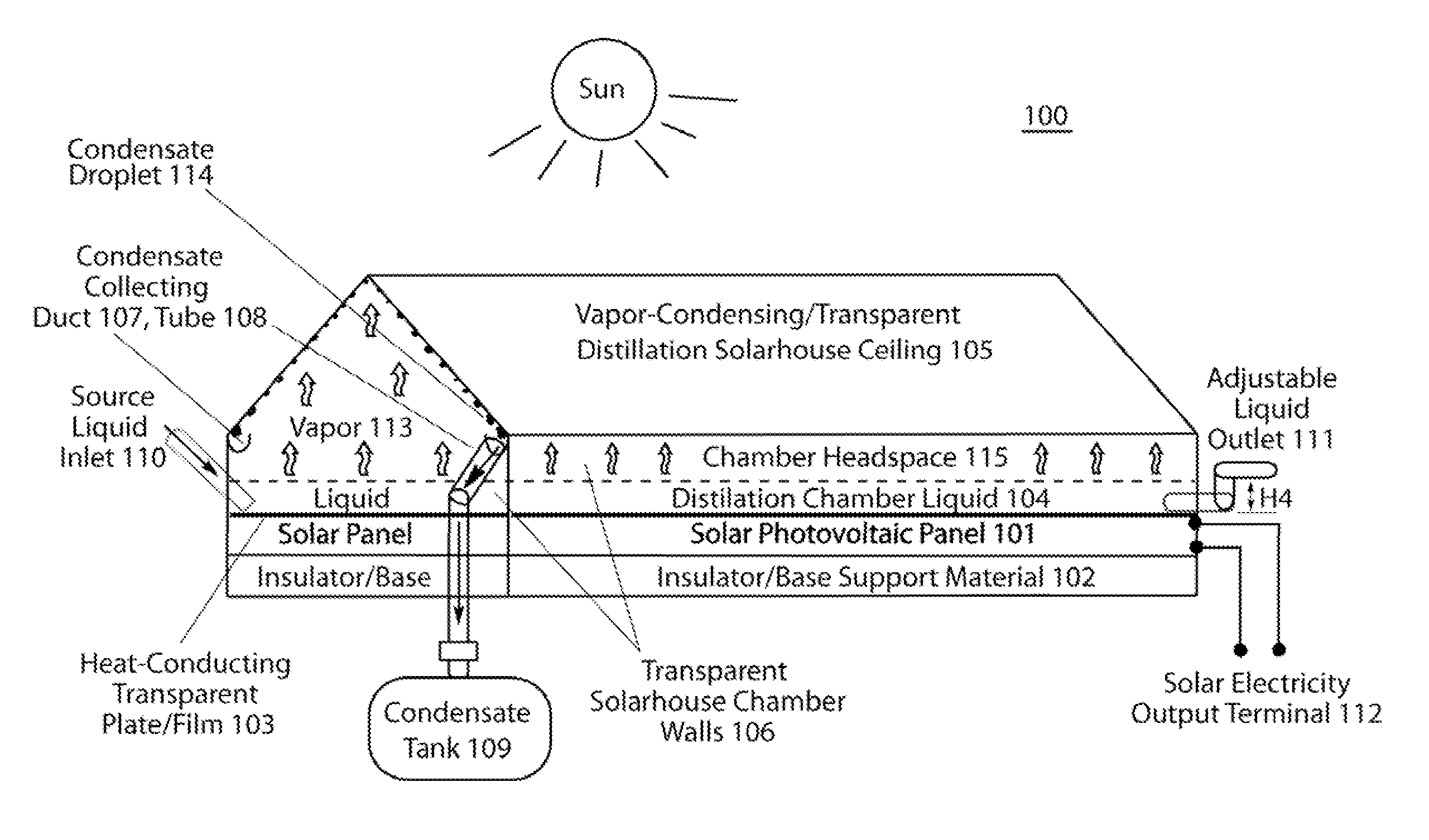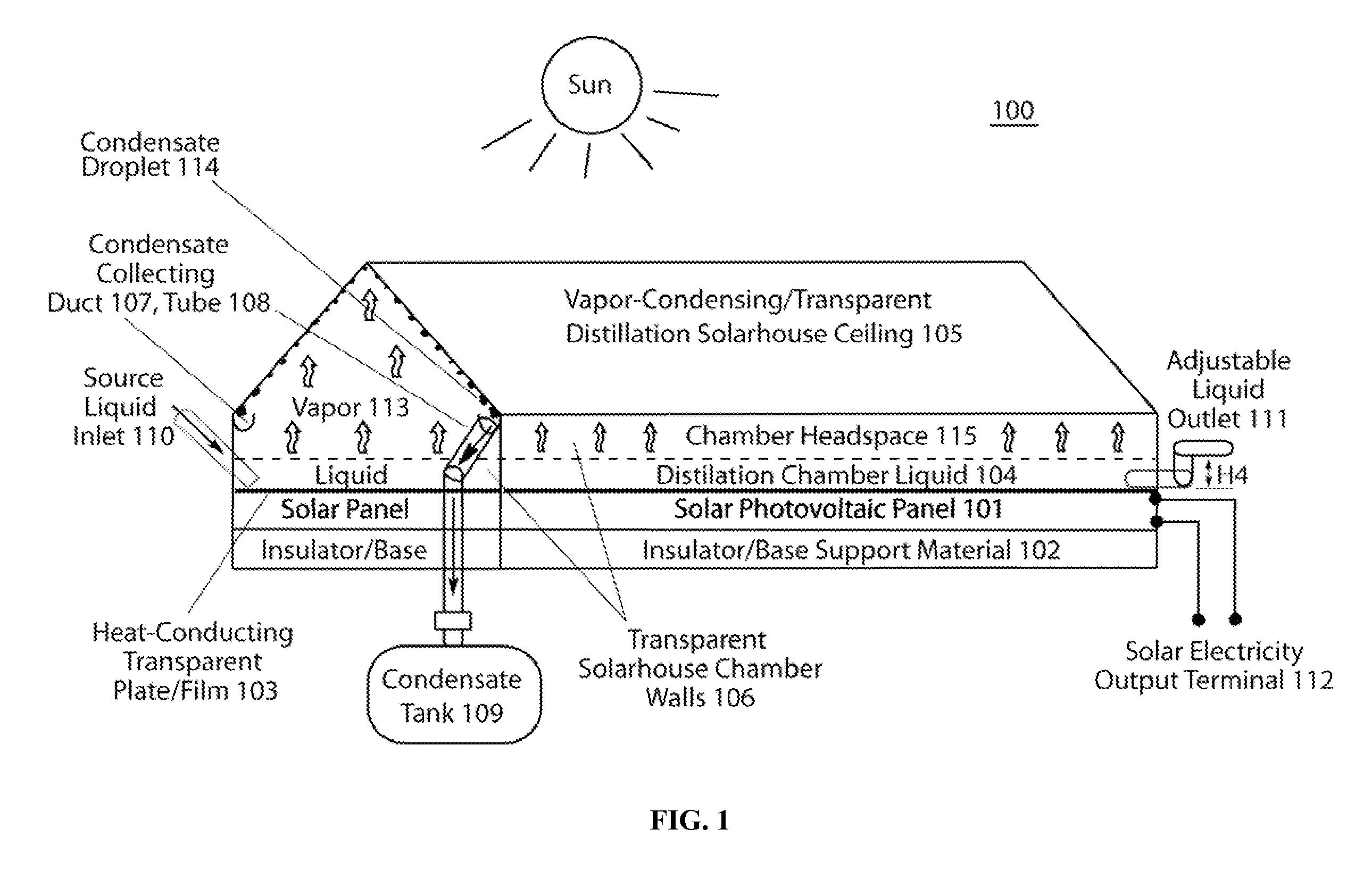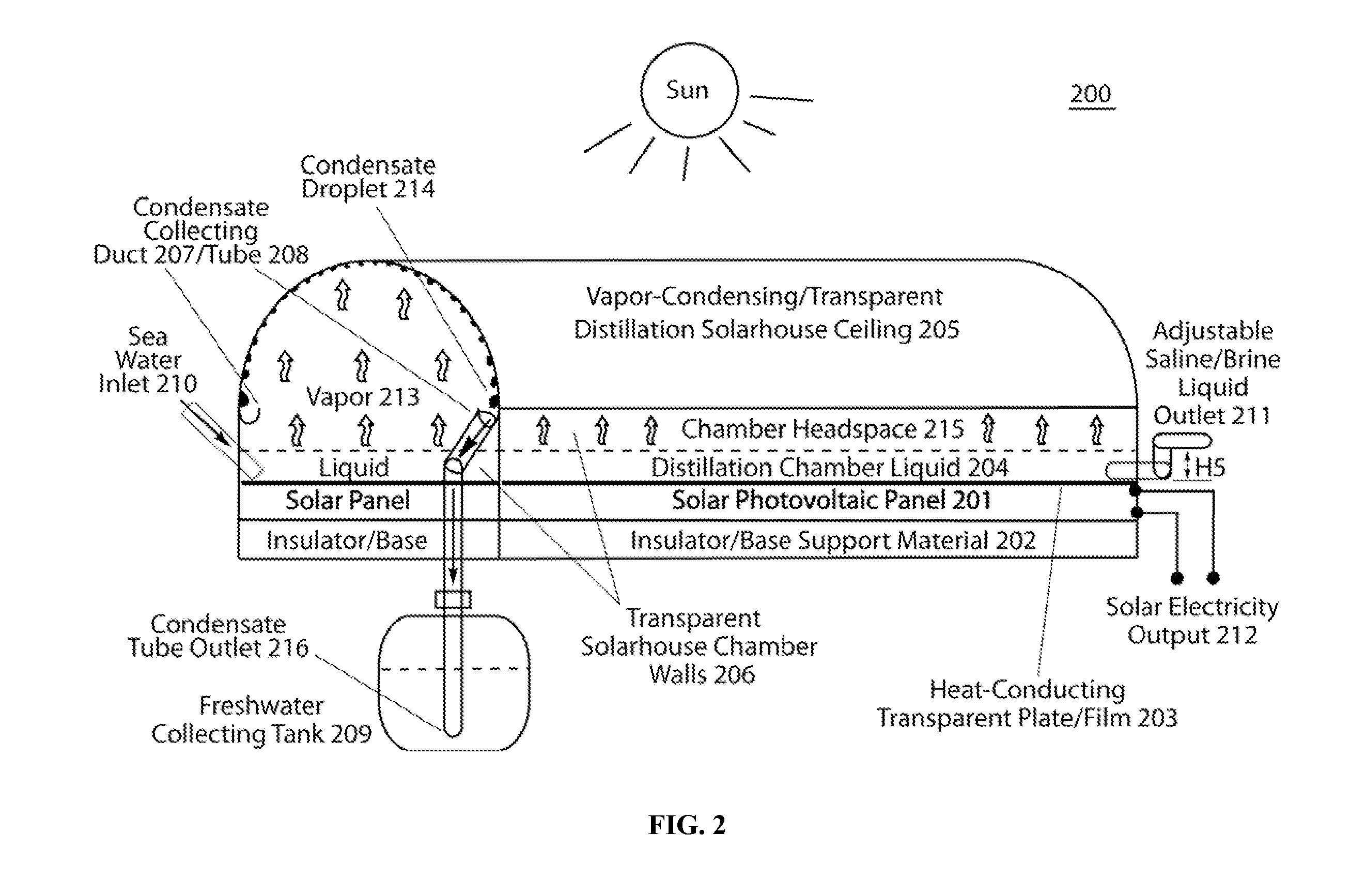[0007]The present invention provides a
hybrid photovoltaic panel-interfaced solar-
greenhouse distillation technology, in which the cooling of solar photovoltaic panel is achieved by an in situ liquid-containing distillation chamber so that the solar waste heat is beneficially utilized, i.e., removed, through liquid distillation, providing effective cooling of the photovoltaic panel for enhanced
solar energy utilization efficiency. This technology is capable of performing solar-greenhouse distillation for various liquids to harvest certain solvents, e.g.,
ethanol, and solute, e.g., salt and
sugar, while co-generating
solar electricity. The photovoltaic panel-interfaced solar-greenhouse distillation
system serves as a special tool for
desalination of
seawater to make freshwater,
sea salt, boiled water, hot steam and
saline / brine products while co-generating
photovoltaic electricity. It may also facilitate the development and screening for certain high
salinity-tolerant algal strains, which can enable utilization of brine as an algal
mass culture medium and as a mechanism to help achieve species control in algal
mass culture for production of advanced biofuels and
bioproducts with
synthetic biology. Since the present invention enables beneficial utilization of photovoltaic panel waste heat for solar-greenhouse distillation, it not only addresses the waste heat issue in
photovoltaics but also provides other benefits including helping overcome the challenges in
seawater desalination and in algal mass culture for production of freshwater,
sea salt, advanced biofuels and
bioproducts important to
sustainable development on Earth.
[0011]In accordance with the present invention, the solar waste heat generated at a photovoltaic panel is effectively utilized, i.e., removed, by in situ solarhouse distillation with its distillation liquid as an immediate
heat sink in thermo contact through a heat-conducting transparent protective plate or film with the photovoltaic panel front surface, providing effective cooling of the photovoltaic panel for enhanced solar energy utilization efficiency. Exemplary embodiments of the present invention enable the utilization of the associated solar waste heat to drive liquid distillation to make a series of beneficial products including, but not limited to, freshwater,
distilled water, hot steam, sea salts, saline / brine products and saline / brine photobiological cultures, in addition to solar
electricity. Therefore, use of the present invention with greenhouse-distillation-related applications yields significantly higher solar energy utilization efficiency than the conventional use of a photovoltaic panel for solar
electricity generation alone.
[0013]Exemplary embodiments in accordance with the present invention serve as an effective tool for
desalination of seawater to make freshwater, sea salts and brine products while simultaneously co-generating solar electricity. Since the photovoltaic panel-interfaced distillation process is operated in a sealed solarhouse chamber, the distillation liquid can be protected from contaminates from which a conventional open pond salt farm suffers including rain, dust, insects,
animal waste such as
bird droppings and other undesirable environmental elements or contaminates. Therefore, use of a rain-proof / dust-proof photovoltaic panel-interfaced distillation solarhouse more reliably produces clean and quality sea salt products than a conventional salt farm. Unlike the conventional open pond / pan salt farms that generally require a relatively
dry season (any unseasonal rains could ruin their salt farm harvest), the use of a photovoltaic-panel-interfaced distillation solarhouse
system enables the making of quality sea salts from seawater / brine even in a rainy season or rainy
geographic area.
[0014]Use of the photovoltaic panel-interfaced solar-greenhouse technology in accordance with the present invention and its associated brine product facilitates the development and screening for certain high
salinity-tolerant algal strains that enable effective utilization of the brine product as an algal mass culture medium for photobiological production of advanced biofuels and bioproducts from CO2 and H2O. The advanced biofuels and bioproducts that may be produced through brine algal mass culture with
synthetic biology are selected from the group consisting of
hydrogen,
ethanol,
butanol /
isobutanol,
propanol, pentanol,
hexanol,
heptanol,
octanol, nonanol, decanol, undecanol,
dodecanol, tetradecanol,
cetyl alcohol,
stearyl alcohol,
long chain alcohols, branched chain alcohols, higher alcohols, isoprenoids, hydrocarbons, biooils, lipids, DHA
omega-3
fatty acid, EPA
omega-3
fatty acid, ARA
omega-6
fatty acid,
acetic acid, proteins, chlorophylls, carotenoids, phycocyanins,
allophycocyanin,
phycoerythrin, their derivatives / related species and combinations thereof.
[0015]In accordance with another exemplary embodiment, the used brine algal culture is harvested for extraction of algal
biomass and / or biofuels or is processed through further distillation and
evaporation to make a dry algal
biomass / salt mixture that may be used, for example, as an
animal feed supplement. In addition, the dry algal
biomass / salt mixture can be pyrolyzed or combusted to produce energy and crude salt that may have other applications including use as a deicing road salt. Consequently, this present invention represents a holistic solar photovoltaic / distillation
energy technology that can produce clean electricity, freshwater, sea salt and brine algal mass culture with nearly
zero waste discharge.
 Login to View More
Login to View More  Login to View More
Login to View More 


